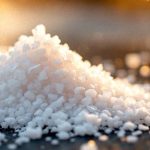Takeaways
- Dandylion contains nutrients that support energy production
- It may help regulate blood sugar for sustained energy
- Dandelion supports liver health, which impacts energy levels
- Its antioxidants combat fatigue and boost vitality
- As an adaptogen, dandelion helps manage stress and maintain energy
Introduction to Dandelion
Dandelion, often considered a common weed, actually provides several surprising health benefits.[1] This plant has been used in traditional medicine for a long time across different cultures. Currently, scientists are studying dandelion’s potential as a natural way to increase energy.[2]
Dandelion plants, with their recognizable bright yellow flowers and jagged leaves, can be found in lawns and fields around the world. While many people see them as unwanted weeds, herbalists have valued dandelions for their medicinal uses for many years. Every part of the dandelion, from the roots to the leaves and flowers, may offer some health advantages.[3]
Recently, dandelion has become more interesting to people because of its potential to increase energy levels.[4] As people look for natural alternatives to caffeine and energy drinks, dandelion appears to be a possible solution. Its many nutrients and unique chemical compounds could help the body produce energy in different ways.[5]
Nutritional Profile of Dandelion
Dandelion is packed with a wide variety of nutrients. This common plant has many vitamins, minerals, and other helpful substances.[6] These nutrients work together to support good health overall and might help improve energy levels.
| Nutrient | Amount per 100g (raw dandelion greens) |
|---|---|
| Vitamin A | 10161 IU |
| Vitamin C | 35 mg |
| Vitamin K | 778.4 µg |
| Calcium | 187 mg |
| Iron | 3.1 mg |
| Potassium | 397 mg |
The nutrients found in dandelion contribute to energy production in several different ways.[7] For instance, B vitamins and minerals like iron play vital roles in how cells create energy.[8] These nutrients help convert the food we eat into energy the body can use.
Dandelion has a high amount of vitamin C, which helps the body absorb iron, further improving its energy-boosting ability.[9] The plant’s mineral content, including magnesium and potassium, also assists energy creation within the cells.[10]
Dandelion and Energy Production
Metabolic Support
Dandelion may help support the body’s metabolic processes.[11] A healthy metabolism is important for maintaining consistent energy levels throughout the day. Certain compounds in dandelion might contribute to improving metabolic function.
Research indicates that dandelion extract may have an effect on how the body processes fats.[12] This could possibly lead to better energy use. By supporting efficient metabolism, dandelion might help maintain stable energy levels.[13]
Blood Sugar Regulation
Dandelion shows potential in helping to keep blood sugar levels steady.[14] Stable blood sugar is essential for maintaining consistent energy all day. Big changes in blood sugar can cause energy crashes and feelings of tiredness.
Studies suggest that dandelion may help manage blood sugar levels. It might achieve this by affecting insulin release and how cells absorb glucose.[15] By encouraging stable blood sugar, dandelion could help prevent energy dips caused by low blood glucose.
Liver Health and Energy
The health of your liver has a direct impact on your energy levels.[16] The liver is important for metabolism and removing toxins. When the liver is functioning well, it helps create a steady flow of energy in the body.
Dandelion has been traditionally used to support liver health.[17] Modern research is now supporting some of these traditional uses. Studies suggest that dandelion may help protect liver cells and support their function.[18]
Dandelion aids liver detoxification in several ways:
- It stimulates bile production, which helps remove toxins
- Dandelion acts as a mild diuretic, supporting the body’s natural detox processes
- Its antioxidants protect liver cells from damage
By supporting a healthy liver, dandelion may indirectly help to boost energy levels.[19] A liver that functions well ensures efficient metabolism and detoxification, both of which affect energy.
Antioxidant Properties
Dandelion contains a good amount of antioxidants.[20] These substances help protect cells from damage caused by oxidative stress.[21] By fighting oxidative stress, antioxidants may help lessen fatigue and increase overall energy levels.[23]
Research indicates that dandelion has various antioxidants, including flavonoids and polyphenols.[22] These compounds neutralize harmful free radicals in the body. Free radicals can damage cells and contribute to tiredness.
To illustrate dandelion’s antioxidant power, consider this comparison:
| Food | Antioxidant Content (ORAC value per 100g) |
|---|---|
| Dandelion Greens | 1,620 |
| Spinach | 1,515 |
| Broccoli | 1,510 |
| Kale | 1,770 |
Although it might not be the highest in antioxidants compared to some superfoods, dandelion still has a good amount.[24] Its antioxidant content adds to its potential to boost energy.
Dandelion as an Adaptogen
Adaptogens are substances that help the body handle stress and maintain balance.[25] They do this by supporting the body’s stress response system. Dandelion has some adaptogenic qualities, which may help with its energy-enhancing effects.[26]
Evidence suggests that dandelion can assist in regulating the body’s stress response.[27] By doing so, it might help prevent the loss of energy that comes with chronic stress.[28] Adaptogens, like dandelion, support the body’s ability to manage physical and mental stress.
The adaptogenic properties of dandelion may help:
- Reduce fatigue associated with stress
- Improve mental clarity and focus
- Support overall resilience and vitality
These effects combine to potentially boost energy levels and combat fatigue.
Forms of Dandelion Supplementation
Dandelion is available in different forms as supplements. Each form has unique benefits and different ways you can add dandelion to your routine. The most effective forms for supporting energy include:
- Dandelion root tea
- Dandelion leaf extract
- Whole dandelion powder
- Dandelion tincture
The best form to choose depends on personal preference and specific health goals.[29] For instance, dandelion root tea is easy to prepare. Extracts and tinctures offer a more concentrated amount of dandelion’s active compounds.[30]
When choosing a dandelion supplement, consider things like convenience, taste, and strength.[31] Some forms might be better for energy support than others. It’s a good idea to speak with a doctor or healthcare provider to figure out the best option for your individual needs.
Optimal Dosage for Energy Benefits
The ideal amount of dandelion for energy benefits can vary from person to person.[32] Factors such as age, overall health, and the specific form of dandelion all play a role. It’s best to start with a smaller amount and gradually increase as needed.[33]
General dosage guidelines based on current research suggest:
- Dandelion root tea: 1-2 cups daily
- Dandelion leaf extract: 500-1000 mg per day
- Whole dandelion powder: 1-2 teaspoons daily
- Dandelion tincture: 2-5 ml, 3 times per day
These recommendations should be used as a general guide. How each person reacts to dandelion can be different. It’s important to pay attention to your body and adjust the amount as needed. Always talk to a healthcare provider before starting any new supplement routine.
Potential Side Effects and Precautions
While usually considered safe, dandelion can cause some side effects in certain individuals. Common side effects may include:
- Digestive upset
- Increased urination
- Allergic reactions (especially in those allergic to ragweed)
Certain groups should exercise caution when using dandelion supplements:
- Pregnant or breastfeeding women
- People with gallbladder problems
- Those taking blood-thinning medications
- Individuals with known allergies to plants in the Asteraceae family
Dandelion can interact with some medications.[34] It may affect how the body processes specific drugs, such as certain antibiotics and diuretics.[35] It’s important to always tell your doctor about any supplements you are taking.
Synergistic Effects with Other Herbs
Dandelion can be combined with other herbs that boost energy.[36] Combining dandelion with particular herbs might enhance its energy-supporting effects. However, it’s important to be careful and knowledgeable when combining herbs.
Potential benefits of combining dandelion with other herbs include:
- Enhanced detoxification support
- Improved digestive health
- Stronger antioxidant effects
Some herb combinations that may enhance dandelion’s energy-boosting effects:
- Dandelion and ginger
- Dandelion and milk thistle
- Dandelion and green tea
Always research herb combinations thoroughly or consult a herbalist before mixing supplements.[37] Although synergistic effects can be beneficial, it’s also possible for interactions between herbs to occur.
Scientific Research on Dandelion and Energy
Current scientific studies on dandelion and energy show promising results.[38] Researchers are exploring different aspects of dandelion’s potential to boost energy. However, more studies are needed to fully understand these benefits.
Several studies have looked at how dandelion affects metabolism and energy production. One study found that dandelion extract increased fat metabolism in liver cells. This effect could potentially contribute to improved energy levels.[39]
Another study examined dandelion’s effects on exercise performance and fatigue. The results suggest that dandelion might help reduce tiredness caused by exercise.[40] However, more research is needed to confirm these findings in humans.
Limitations of existing research include:
- Small sample sizes in many studies
- Lack of long-term human trials
- Variability in dandelion preparations used
Future research directions for dandelion in energy enhancement include:
- Large-scale human clinical trials
- Studies on specific dandelion compounds and their effects
- Research on dandelion’s impact on mitochondrial function
As research progresses, we may gain a clearer understanding of how dandelion supports energy levels.[41]
Incorporating Dandelion into Your Diet
Adding dandelion to your daily meals is simple and can support your energy levels. Here are some easy ways to include dandelion in your diet:
- Add fresh dandelion greens to salads
- Sauté dandelion leaves as a side dish
- Brew dandelion root tea
- Use dandelion flowers in baked goods
For those looking to maximize dandelion’s energy-boosting potential through diet, consider these tips:
- Combine dandelion with other nutrient-rich foods
- Include dandelion in your morning routine for all-day energy support
- Use dandelion as a coffee substitute to avoid caffeine crashes
- Experiment with different parts of the plant for varied benefits
Remember that consistency is important when using dandelion for energy support. Regular consumption may provide the best results.[42]
FAQ
How long does it take to feel the energy-boosting effects of dandelion?
Can dandelion replace caffeine as an energy source?
Is wild-harvested dandelion safe to consume for energy benefits?
How does dandelion compare to other natural energy boosters?
Can dandelion help with chronic fatigue syndrome?
Are there any age restrictions for using dandelion as an energy supplement?
Conclusion
Dandelion is emerging as a promising natural way to boost energy.[49] Its many nutrients and unique compounds support the body’s energy production in various ways. From supporting liver health to regulating blood sugar, dandelion offers a comprehensive approach to improving energy.
The potential energy benefits of dandelion go beyond simple stimulation. Unlike caffeine, dandelion helps support sustainable energy production.[50] It works with the body’s natural processes to increase vitality and reduce tiredness.
Adding dandelion to a healthy lifestyle may provide the best results for improved energy. When combined with a balanced diet, regular exercise, and good sleep habits, dandelion can be a helpful part of your routine for increasing energy.
As research continues, we may discover even more ways that dandelion supports energy and overall health. For now, this common plant offers a natural and gentle way to boost vitality. Whether consumed as tea, added to salads, or taken as a supplement, dandelion provides numerous potential benefits for those looking for natural energy support.
Dandelion has a history of use in traditional medicine across various cultures. Modern research is exploring its bioactive compounds and their potential health effects.
Source: “Dandelion (Taraxacum Genus): A Review of Chemical Constituents and Pharmacological Effects” https://www.ncbi.nlm.nih.gov/pmc/articles/PMC10343869/
While not a primary focus, research has investigated dandelions effect on metabolism and energy. More studies are still needed to confirm these effects.
Different parts of the dandelion contain different bioactive compounds, each with its potential benefits. The root is often used in teas and supplements, while the leaves and flowers are used in foods or extracts.
Source: “Dandelion (Taraxacum Genus): A Review of Chemical Constituents and Pharmacological Effects” https://www.ncbi.nlm.nih.gov/pmc/articles/PMC10343869/
The search for natural alternatives to caffeine and energy drinks has driven more interest in plants like dandelion with purported energy benefits.
Dandelion contains vitamins, minerals, and bioactive compounds that may influence energy production, but the mechanisms and extent of these effects need more investigation.
Dandelion is a source of vitamins like A, C, and K, as well as minerals like potassium, calcium, and iron, among other nutrients.
Source: “Potential use of the Asteraceae family as a cure for diabetes: A review of ethnopharmacology to modern day drug and nutraceuticals developments” https://www.ncbi.nlm.nih.gov/pmc/articles/PMC10441548/
Some of the nutrients like B vitamins and iron are important cofactors in energy production, but direct research specific to dandelion is limited.
B vitamins are coenzymes in metabolic pathways converting food into energy. Iron is a component of hemoglobin, important for oxygen transport.
Vitamin C enhances iron absorption in the gut, and while Dandelion is a source, it may not contain ‘high’ levels compared to other sources.
Source: “Potential use of the Asteraceae family as a cure for diabetes: A review of ethnopharmacology to modern day drug and nutraceuticals developments” https://www.ncbi.nlm.nih.gov/pmc/articles/PMC10441548/
Magnesium is involved in many enzymatic reactions in energy production. Potassium is crucial for nerve function and muscle contraction, which are essential for physical energy and activity. Dandelion does contain these minerals.
Source: “Potential use of the Asteraceae family as a cure for diabetes: A review of ethnopharmacology to modern day drug and nutraceuticals developments” https://www.ncbi.nlm.nih.gov/pmc/articles/PMC10441548/
Dandelion’s effect on metabolism is being explored, and while some studies are promising, further research is necessary to confirm specific mechanisms.
Some studies in animal or cell culture models have suggested dandelion may affect lipid metabolism. However, research is ongoing and more human studies are needed.
Source: “Antioxidant characteristics and hepatoprotective effects of a formula derived from Maydis stigma, Nelumbo nucifera and Taraxacum officinale against carbon tetrachloride-induced hepatic damage in rats” https://pubmed.ncbi.nlm.nih.gov/33824122/
While a link can be hypothesized, its not directly proven, and should be considered a potential benefit. The mechanisms are not yet fully understood, and human studies are needed.
Some research has investigated dandelion’s impact on insulin sensitivity and blood glucose regulation, and shows early promise in this area. However, the evidence is still emerging and the mechanisms need to be further elucidated.
Source: “Plants of the Spontaneous Flora with Beneficial Action in the Management of Diabetes, Hepatic Disorders, and Cardiovascular Disease” https://www.ncbi.nlm.nih.gov/pmc/articles/PMC7911329/
Some studies suggest that dandelion’s components may have effects on insulin signaling pathways and glucose transporters, but more rigorous human trials are needed to confirm these findings.
Source: “Plants of the Spontaneous Flora with Beneficial Action in the Management of Diabetes, Hepatic Disorders, and Cardiovascular Disease” https://www.ncbi.nlm.nih.gov/pmc/articles/PMC7911329/
The liver plays a vital role in glucose homeostasis, fat metabolism, and detoxification, all of which impact the body’s energy production and levels.
Dandelion has been used for centuries in traditional medicine for liver and gallbladder issues, based on the belief that it can help promote the liver’s detoxification processes. Modern research is investigating these claims.
Research, mainly in animal or cell models, suggests dandelion compounds can protect liver cells. More human trials are required to establish these findings and understand the underlying mechanisms.
Source: “Antioxidant characteristics and hepatoprotective effects of a formula derived from Maydis stigma, Nelumbo nucifera and Taraxacum officinale against carbon tetrachloride-induced hepatic damage in rats” https://pubmed.ncbi.nlm.nih.gov/33824122/
A healthy liver is crucial for efficient metabolism, which supports energy production. Dandelion’s potential liver-supporting effects might then have a secondary benefit on energy levels. More research is needed to confirm.
Dandelion contains antioxidants like flavonoids and polyphenols. These substances may help protect cells against damage from free radicals.
Source: “Taraxacum officinale and related species-An ethnopharmacological review and its potential as a commercial medicinal plant.” https://pubmed.ncbi.nlm.nih.gov/25858507/
Antioxidants neutralize harmful free radicals, helping to prevent damage to cells from oxidative stress, which is linked to aging and disease.
Various studies have confirmed the presence of these antioxidants in dandelion, contributing to its potential protective benefits.
Source: “Taraxacum officinale and related species-An ethnopharmacological review and its potential as a commercial medicinal plant.” https://pubmed.ncbi.nlm.nih.gov/25858507/
While reducing cell damage is beneficial, the effect on energy and fatigue is complex. More studies on Dandelion specifically are needed to make a strong conclusion.
Dandelion contains a good variety of antioxidants, but it may not have the same concentration as some so-called ‘superfoods’ known for extremely high levels of antioxidants. It should still be considered a good source.
Adaptogens are believed to support the body’s ability to cope with various stressors and maintain homeostasis.
While some research indicates that dandelion may have adaptogenic effects, the specific compounds and their modes of action in supporting the stress response still require further investigation and is not fully proven.
While there is some indication of this, there are no definitive studies on dandelion specifically on the regulation of the stress response. More research is required.
The link between chronic stress and energy loss is well-established. Given that Dandelion may support the stress response, its possible it helps maintain energy, but more focused studies are required.
Options include tea, capsules, extracts, and tinctures, with personal preference, convenience and health goals helping in deciding.
Tea uses the whole or cut root, while extracts and tinctures use concentrated plant material, providing more of the bioactive compounds in smaller volumes.
Each of these factors can influence the ease and compliance in taking supplements regularly.
Factors such as age, metabolism, health status, and sensitivity to plant compounds can influence the ideal dosage for an individual.
Starting with a smaller amount helps assess tolerance and reduce the risk of adverse effects. Gradual increases can then be used if needed.
Dandelion can have diuretic effects and may interact with other drugs like diuretics, certain antibiotics or blood thinners. Always check with your healthcare provider.
Dandelion may interfere with how the body processes certain drugs. The interaction with diuretics and antibiotics is noted due to the diuretic effects of dandelion and the way the body processes medications.
While some herbs may have synergistic effects when combined, it’s important to research these combinations thoroughly as interactions are also possible. Seek expert help.
Herbal combinations can have synergistic effects, but they can also be detrimental if not managed properly. Consulting with a healthcare provider is advised.
Ongoing research suggests potential benefits for energy, however further and more extensive human studies are required.
Research performed on cells (in-vitro) may not translate into humans (in-vivo). However, the results can be used as a starting point for further studies.
Source: “Antioxidant characteristics and hepatoprotective effects of a formula derived from Maydis stigma, Nelumbo nucifera and Taraxacum officinale against carbon tetrachloride-induced hepatic damage in rats” https://pubmed.ncbi.nlm.nih.gov/33824122/
Some research indicates that dandelion may aid in reducing fatigue associated with exercise. However, the effects are not fully confirmed, and more human research is necessary.
As more research is conducted, the mechanisms and potential energy benefits of Dandelion may become more clear and comprehensive.
Regular use of any supplement tends to be more beneficial than sporadic usage, with Dandelion potentially following this rule.
Individual factors play a large role in response time to dietary or herbal supplements. Dandelion is no different and the time frame is not absolute.
Caffeine is a stimulant, whereas dandelion is believed to support metabolic processes and the use of energy. They have very different pathways.
Harvesting wild dandelions carries some risks. You must be 100% sure of identification, that the location has not been sprayed with pesticides or herbicides, and is free from other pollutants.
Caffeine is a stimulant that may cause spikes and drops in energy, while Dandelion potentially promotes a more gentle, gradual and potentially sustained source of energy.
Dandelion’s effect on chronic fatigue needs further specific studies. It may help, but is not a cure or should be taken as a primary solution for chronic fatigue.
Although there aren’t any strict age restrictions, appropriate dosage should be followed for all individuals. Consult your healthcare provider before use.
Dandelion’s potential benefits are showing promise, more robust research is needed before conclusive statements can be made.
Dandelion does not have the stimulant effect of caffeine, and is thought to work differently in the body.



